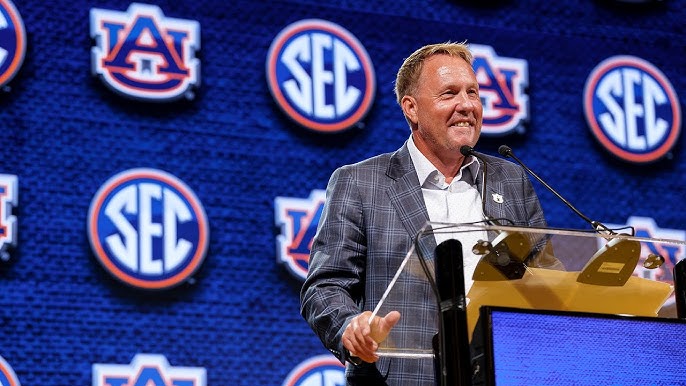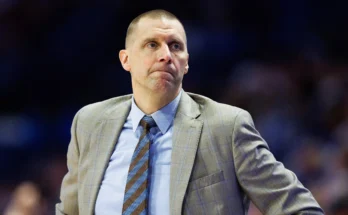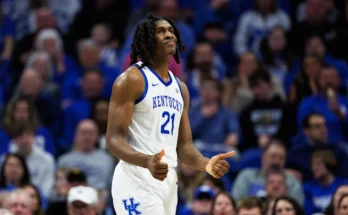Auburn Coach Hugh Freeze Responds to Golf Backlash and Mounting Pressure Amid Disappointing Recruiting Results Entering Critical 2025 Season
Hugh Freeze, entering his second full season as head coach of Auburn football, finds himself under increasing scrutiny from fans and analysts alike—not just for the Tigers’ recruiting struggles, but also for something far more unexpected: his time spent on the golf course. As images and social media posts showing Freeze at various golf outings circulated during the heat of recruiting season, frustration from the Auburn faithful quickly boiled over, with many questioning the optics, timing, and implications of their coach’s leisure activities.
Freeze is no stranger to criticism, having navigated controversy during past coaching stops, but the current backlash represents something deeper—a signal of the growing impatience around the Auburn program. Expectations remain sky-high on the Plains, and a program that once routinely finished in the top ten nationally in recruiting is now fighting just to stay in the top 30. In that context, every decision, every action, and every hour of the coach’s time comes under a microscope.
The frustration among fans has been fueled by a string of recruiting misses in the 2025 cycle, especially in the month of June—a period often referred to as the critical summer push. Auburn lost out on multiple high-profile targets, including several in-state prospects who opted for rival programs like Alabama, Georgia, and even Florida State. The optics of losing key recruits while your coach is seen teeing off at charity events or relaxing at high-profile golf outings created the perfect storm.
Social media, always a reflection of the fanbase’s mood, was quick to erupt. “Hope he can drive a golf ball better than he can close a recruit,” one user posted on X (formerly Twitter). Others shared memes mocking Freeze’s golfing habits, sarcastically referencing his “offseason priorities.”
Freeze, for his part, addressed the criticism directly at SEC Media Days in Nashville, offering a measured but firm defense of how he allocates his time and energy during the offseason.
“I understand the passion. I understand the expectations,” Freeze said. “But I also think there’s a big misunderstanding of what these golf outings represent. They’re not vacations. They’re often fundraising events or opportunities to connect with key supporters of our program.”
Freeze emphasized that much of his time on the course has been part of donor engagement or university-sponsored initiatives designed to support Auburn athletics as a whole. “If I can spend four hours with someone who’s going to invest in Auburn’s future—whether through NIL, facilities, or scholarships—that’s not a waste of time,” he said.
He also made it clear that recruiting remains his top priority, saying, “There’s not a single day that I’m not on the phone, texting, Zooming, or watching tape. The work doesn’t stop because I play 18 holes.”
Still, for a fanbase conditioned to expect elite recruiting results, the explanations haven’t quieted all concerns. Auburn currently sits well outside the top 15 in most national recruiting rankings, despite Freeze’s reputation as a dynamic recruiter and his track record at Ole Miss, where he landed top-five classes in back-to-back years. The disappointment is compounded by the success of SEC rivals—most notably Alabama under new coach Kalen DeBoer, who has maintained recruiting momentum post-Saban, and Georgia, which continues to build a juggernaut under Kirby Smart.
Part of the challenge for Freeze is that Auburn is still recovering from years of instability. Between the end of the Malzahn era and the chaotic Bryan Harsin tenure, the Tigers’ recruiting relationships eroded, and confidence among in-state high school coaches suffered. Freeze acknowledged that reality, saying, “We’re still rebuilding trust in some areas. That takes time, and we knew that coming in.”
Yet, even with that context, fans expect progress—and soon. The transfer portal has offered Auburn some quick wins, with impactful additions on both sides of the ball heading into 2025. But in the long run, Freeze knows he needs to land elite high school talent to compete with the SEC’s upper echelon.
“We’re not shying away from the standard here,” Freeze said. “We’re going to build a championship-level program, and that means recruiting the best. We’ve got to win battles, and we will.”
To that end, Freeze and his staff have refocused their approach, particularly with regards to in-state recruiting. Auburn has historically built its best teams around top Alabama talent—players like Cam Newton, Kerryon Johnson, and Tank Bigsby. But too many elite prospects have left the state in recent years, and Freeze aims to change that.
He has ramped up outreach to high school coaches, increased Auburn’s visibility at 7-on-7 tournaments and satellite camps, and empowered his staff to build genuine relationships—not just with prospects, but with their families and support systems.
“It’s about consistency,” Freeze said. “You can’t just show up two weeks before signing day and expect to win. It takes a year-long investment.”
While the 2025 class hasn’t produced the splash results yet, Freeze remains confident that a strong finish is possible. Several top targets remain uncommitted, and Freeze hinted that Auburn is in “great position” with a few late-summer decision-makers.
Still, even the strongest possible finish to this cycle may not silence all the critics. In the SEC, perception can carry as much weight as performance, and Freeze’s public image—as a calm, even-keeled coach who doesn’t appear rattled—can be a double-edged sword. When things go well, he’s praised for his composure. But in times of struggle, that same demeanor can be viewed as aloof or unbothered.
The golf controversy is emblematic of that dynamic. On one hand, it’s a manufactured crisis—coaches, like anyone else, are entitled to brief breaks, especially when those breaks are still tied to their jobs. On the other hand, it points to a larger issue: a fanbase growing restless for progress and worried about falling behind in an SEC that’s more competitive than ever.
With Texas and Oklahoma now joining the league, and the College Football Playoff expanding to 12 teams, the window for programs like Auburn to reestablish themselves as national contenders is narrowing. Freeze knows this. He’s made no secret of his ambition to lead Auburn back to Atlanta and beyond.
But to do that, he must rebuild trust—not just with recruits, but with Auburn fans as well. And that starts with winning, both on the field and on the trail.
“We’ve got the blueprint. We’ve got the support. We’ve got the passion,” Freeze said. “Now it’s about execution, and I take full responsibility for that.”
Heading into the 2025 season, all eyes will be on how Freeze responds to this moment. The team returns a strong defensive core, an improved offensive line, and what many believe could be a breakout quarterback. If Auburn delivers on the field, the golf questions—and the recruiting panic—may fade into the background.
But if the Tigers stumble out of the gate, or if they miss on more key targets, the scrutiny will only intensify. In that case, the rounds of golf will become a louder talking point, and Freeze’s approach to leadership will face deeper questioning.
For now, Freeze is staying the course. “I’ve been through challenges before. I’ve built programs before. I believe in what we’re doing,” he said. “The results will come.”
The Auburn fanbase is ready—maybe even desperate—to believe that. Whether Freeze can deliver, however, will define not just this season, but his tenure on the Plains.



